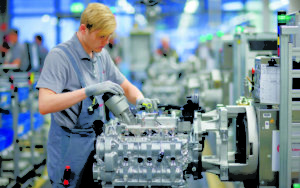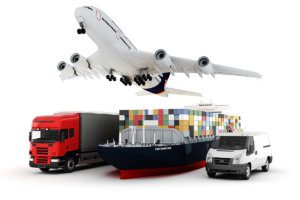
Industrial production in Ukraine in September 2018 decreased by 1.3% compared to September 2017, while in August it fell by 0.5% compared to August 2017, in July the growth was 2.9%, in June this figure was 2.2%, and in May some 2.5%, the State Statistics Service has said. The agency said that with the adjustment to the effect of calendar days, industrial production in September 2018 also fell by 0.7% from September 2017, while in August 2018 from August 2017 the decline was 0.5%, in July 2018 the growth was 2.3%, in June 2018 some 2.5%.
The service said industrial production in September of this year increased by 1.7% compared to the previous month, and taking into account the seasonal factor it was the same as in August 2018.
In the nine months ending September 2018, the growth of industrial production in Ukraine slowed to 1.8% compared to the same period in 2017, while this figure stood at 2.2% for the eight months, at 2.6% for the seven months, and at 2.5% for the six months.
The supply of electricity, gas and steam in the nine months grew by 2.2%, while the processing industry saw a 1.6% increase, and output in the mining industry grew by 2.0%.
In September 2018 alone, the processing industry reduced production by 1.6% from September 2017, while the supply of electricity, gas and steam fell by 3.9%, and the mining industry saw a 0.7% increase in output.
The State Statistics Service said that industrial production in Luhansk region in September 2018 compared with September 2017 did not change, while Donetsk region saw a 1.2% decrease in industrial output.
As for other regions, a positive result in industry in September this year was recorded in Sumy region (growth by 41.7%), Ternopil region (4.9%), Zaporizhia region (by 4.4%), Zakarpattia (by 3.2%) Ivano-Frankivsk region (2%), Poltava region (1.2%), and Kyiv region (1.5%).
The following regions posted a decrease in industrial production: Odesa region by 14%, Volyn region by 10.3%, Lviv region by 5.4%, Zhytomyr region by 5.1%, Rivne region by 4.9%, Kirovohrad region by 3.4%, Cherkasy region by 3.3%, Kharkiv region by 3%, and the city of Kyiv by 6.3%.
As reported, industrial production in Ukraine in 2017 decreased by 0.1% after growing by 2.4% in 2016. This was preceded by four years of decline: in 2015, industrial production decreased by 13%, in 2014 by 10.1%, in 2013 by 4.3%, in 2012 by 0.7%.

Ukrainian Prime Minister Volodymyr Groysman hopes that the parliament would approve at second reading the bill on the national budget of Ukraine for 2019 before December 1, 2018. “Now it is being finalized for second reading together with the Ukrainian parliament. I hope that, and it must be done so, by December 1 Ukraine will receive a balanced, realistic national budget,” he said at a government meeting on Wednesday.
As reported, the International Monetary Fund (IMF) staff and Ukraine have reached an agreement on economic policies for a new 14-month Stand-By Arrangement (SBA), which will replace the arrangement under the Extended Fund Facility (EFF), approved in March 2015 and set to expire in March 2019.
The agreement is subject to approval by the fund’s management and approval by its board of directors. The board’s meeting is expected to take place at the end of the year after the Verkhovna Rada adopts the national budget for 2019 in accordance with the recommendations of the IMF and the increase in gas and heating tariffs for households, reflecting market trends while maintaining support for low-income consumers.

The transport enterprises of Ukraine in January-September 2018 reduced carriage of goods by 1.1% compared to January-September 2017, to 462.5 million tonnes.
According to the State Statistics Service, freight turnover for this period decreased by 2.6%, to 247.9 billion tonne-kilometers. According to statistical data, in January-September 2018 railways transported inside the country and for exports 199.1 million tonnes of cargo, which is 3.5% less than in January-September 2017.
Transportation of coal decreased by 4.4%, oil and petroleum products by 11.8%, grain and cereals by 14%, cement by 3.9%, construction materials by 8.8%, timber by 9.6%, coke by 2.8%, ferrous metals by 1.3%. At the same time, transportation of chemical and mineral fertilizers increased by 2.3%, iron and manganese ore by 3.5%, and scrap metal by 0.3%.
The volume of cargo pumping through pipelines in January-September 2018 compared with January-September 2017 fell by 4.4%, to 80.5 million tonnes.